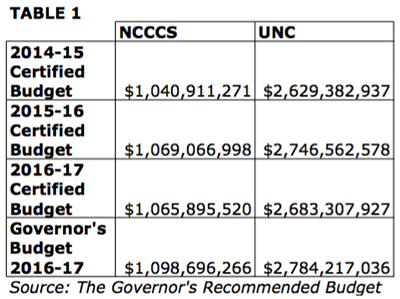Publisher's note: The John William Pope Center for Education Policy provides a treasure trove of information suggesting the better path forward in regards to North Carolina's number one issue - public education. Public education, at all levels, requires a significant amount of funding from our state government, and all one hundred North Carolina counties, so it is essential that leaders effecting education policy get it right, and know that concerned entities, like the John William Pope Center, will be minding their progress to do so. We welcome the John William Pope Center for Education Policy to our growing readership, and expect our readers to learn all they can to do their part in this wise endeavor to better educate our People.
The author of this post is Jenna A. Robinson.
Lawmakers returned to Raleigh at the end of April to attend this year's "short session." On the agenda are adjustments to the state budget and a few policies left unresolved when legislators adjourned last year. Many of those policies focus on community colleges.
Governor Pat McCrory's budget seeks to fulfill several community college priorities. Some highlights from his
proposal include:
- $16.7 million for Community College Student Success: Provides locally determined support services to ensure community college students graduate with a credential or degree. Such support services may include career coaches, academic advising and counseling, tutoring labs, and supplemental education.
- $7.5 million for Community College Equipment: Upgrades and maintains instructional equipment. These funds are in addition to the $49 million already appropriated for 2016-17. The total of $56.5 million is a 15 percent increase over the level appropriated in 2012-13.
- $500,000 for NCWorks Apprenticeships: Increases apprenticeship opportunities across North Carolina. The program helps businesses find, train, and retain qualified workers, and offers individuals the chance to gain skills and experience through the community college system. Total funding, including the governor's $500,000 recommendation, would be $1.35 million for FY 2016-17.
- $500,000 to Promote Competency-Based Education: Supports development of a uniform system for granting academic credit for prior learning and experience. Efforts underway include the ability of military veterans to count their experience as military medics, police, and systems operators toward community college credentials to become emergency management technicians, law enforcement officers, or information technology experts.
The governor's budget is just a starting point. The General Assembly will decide how much to spend on community colleges and where to invest the money. Already appropriations committee chairmen from both the House and Senate
announced that they plan to hold spending for the 2016-17 fiscal year to $22.225 billion, lower than the governor's budget total. (Table 1 compares the governor's proposed budget with the 2016-17 certified budget-approved last year-and budgets for the past two fiscal years.)

But several proposals making their way through the legislature indicate that lawmakers are committed to community college reform and expansion. One bill,
S 738, proposes the North Carolina Community College System study and propose improvements to the
NCWorks Apprenticeship Program. According to the legislation, the study "may include proposals to incentivize the program for businesses who participate, including proposals that would reduce the tuition costs that businesses pay for students enrolled."
Another program that will bring increased enrollment and funding to North Carolina's community colleges is NC GAP. Some form of the program, which redirects low performing students from the UNC system to community colleges, will be implemented in the next two years (I wrote about NC GAP
here). And
H 1034, a bill introduced in the House, would restore tuition waivers to North Carolina senior citizens who attend up to six hours of community college courses, which would also increase community college enrollment.
The Connect NC Bond, promoted by the legislature and approved by voters in March, also allocates $350 million to community colleges. The money will go to new structures, repairs, and renovations on the state's 58 community college campuses.
These changes will take place after the system has installed its new chancellor. Dr. James "Jimmie" C. Williamson will become the eighth president for the NC Community Colleges on July 1, 2016.
The lion's share of North Carolina's higher education appropriations still goes to the UNC system. In the governor's budget, UNC would receive $2.78 billion, up from $2.75 billion in 2015-16. McCrory's budget allocates most of the new spending to fund enrollment increases, bonuses for faculty and staff, and scholarships for education and STEM majors. The Connect NC Bond provides another $980 million in funding for capital projects.
Despite this funding disparity, community colleges are receiving more attention now than ever. If this session is any indication, community colleges will play a large part in North Carolina's future.













 But several proposals making their way through the legislature indicate that lawmakers are committed to community college reform and expansion. One bill,
But several proposals making their way through the legislature indicate that lawmakers are committed to community college reform and expansion. One bill, 











